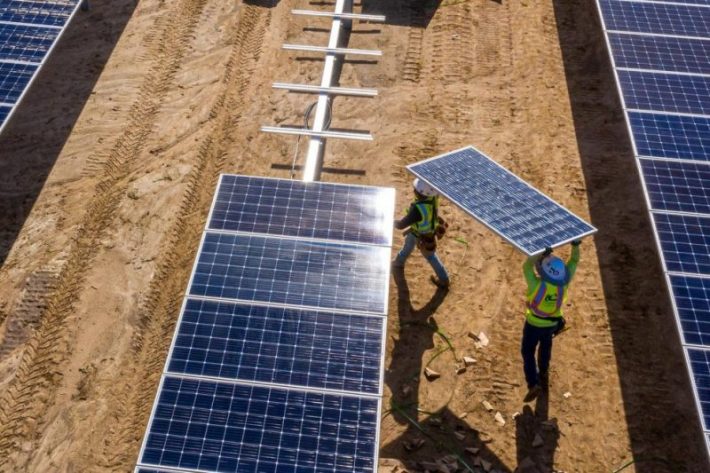The US is set to scrap a tariff exemption on solar panels – exported from China and other parts of Asia – to offer more protection to domestic solar factories.
The government said it will also make it easier for backers of solar projects in America to claim a subsidy for using locally made products.
The news, announced by the White House on Thursday, aims to protect domestic manufacturers against imports of double-sided panels.
ALSO SEE: Microsoft Asks China AI Staff if They Want to Shift Abroad
The moves come as President Joe Biden touts his economic policies ahead of an election in November against his predecessor, former President Donald Trump.
As part of the fight against climate change, Biden has sought to expand investment in the manufacturing of clean energy products, aiming to reduce the nation’s reliance on Chinese-made goods.
The White House said it would soon remove a two-year-old trade exemption that has allowed imports of bifacial panels to avoid duties. Those panels were a small part of the market at the time of the exemption but are now the main technology used in utility-scale solar projects.
That plan was first revealed by Reuters last month.
Biden will also end a waiver on tariffs imposed on solar panels made by Chinese companies in Malaysia, Cambodia, Thailand and Vietnam.
10% domestic content bonus
He imposed the temporary waiver two years ago at the request of US project developers who rely on cheap imports to make their facilities cost-competitive. Since then, however, the White House said US manufacturing has expanded and those producers face competition from a surge in Chinese solar factory capacity that has depressed prices.
“These actions will provide a boost to domestic solar producers, but the impact of Chinese oversupply on US investments in the solar market remains a challenging issue,” John Podesta, Biden’s senior adviser for international climate policy, said on a call with reporters.
Biden’s Treasury Department also issued new rules on how clean energy project developers can qualify for a tax credit meant to incentivize the use of US equipment.
The 10% domestic content bonus is in addition to a 30% credit for renewable energy facilities included in Biden’s landmark climate change law, the Inflation Reduction Act.
Treasury first unveiled guidelines for claiming the bonus credit a year ago, but project developers complained that the complex rules made it difficult to use.
To qualify, the IRA specifies that 40% of the cost of a project’s so-called manufactured products must be made in the United States. Those products could include solar panels, inverters, or battery packs.
But determining the cost of labour and materials for products built with components from multiple suppliers – often in different parts of the world – proved challenging.
Under the new rules, Treasury will allow project developers to use default cost percentages determined by the Department of Energy to qualify for the credit.
Treasury said it was still considering additional rules that would help offshore wind developers qualify for the domestic content bonus. It is also evaluating ways to incentivize manufacturing of solar wafers, the building blocks for solar cells.
Qcells, a division of Korea’s Hanwha Corp that is investing $2.5 billion in US solar factories, said the Biden administration’s measures were “critical to creating tens of thousands of jobs in America.”
- Reuters with additional editing by Jim Pollard
ALSO SEE:
US Set to Restore China Solar Tech Tariffs After Korea Firm Plea
India Now the World’s Third Biggest Generator of Solar Power
Trade War Heating Up: China Hits Back After Biden Boosts Tariffs
China’s Solar Sector Seen Facing Years of Oversupply, Low Prices
China’s Cheap Solar Panels Killing Europe’s Solar Manufacturers
China Solar Panel Costs Plunge in 2023, 60% Cheaper Than US
China to ‘Dominate’ Global Solar Supply Chain For Next Decade
US Accuses China Solar Panel Firms of Dodging Tariffs
























